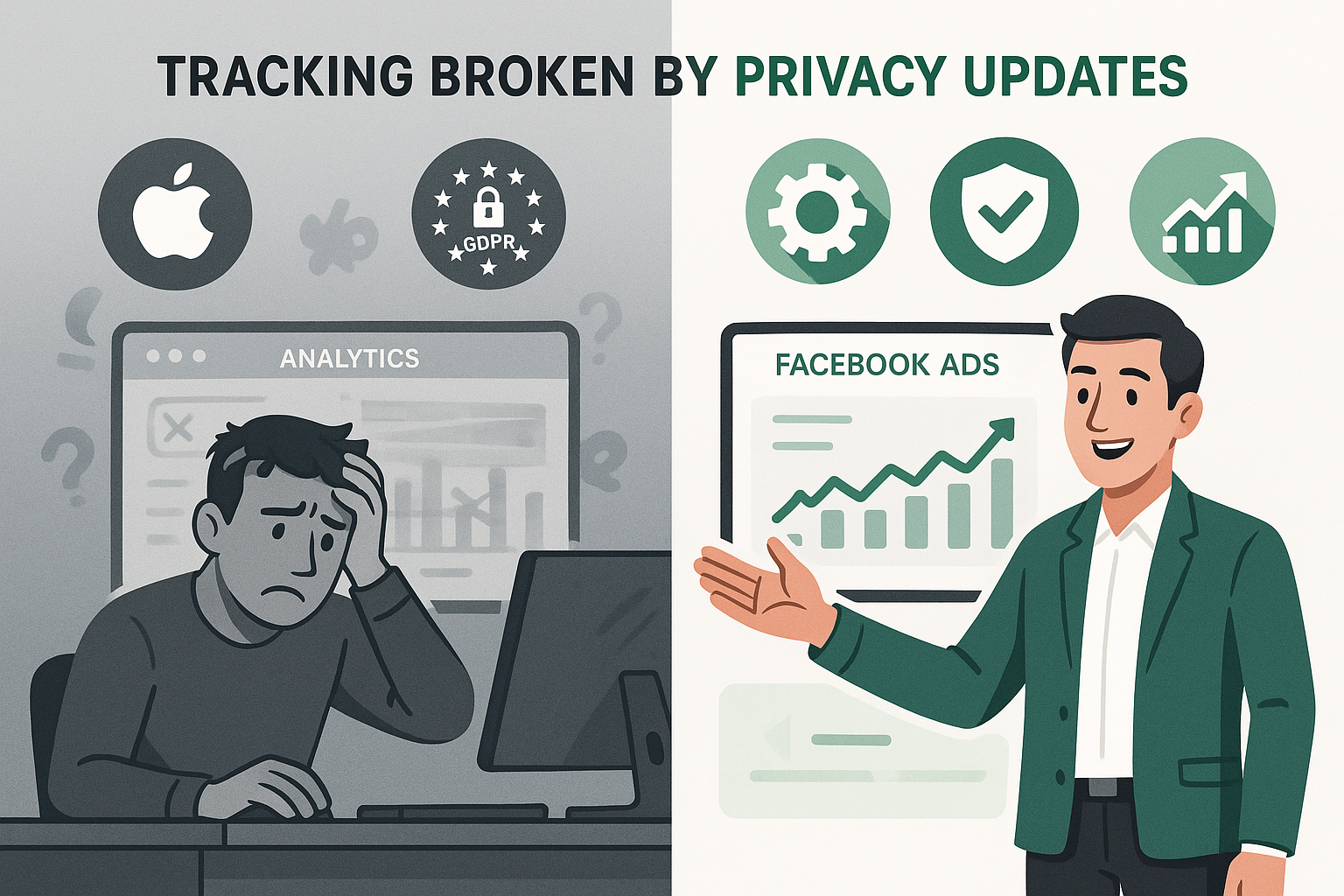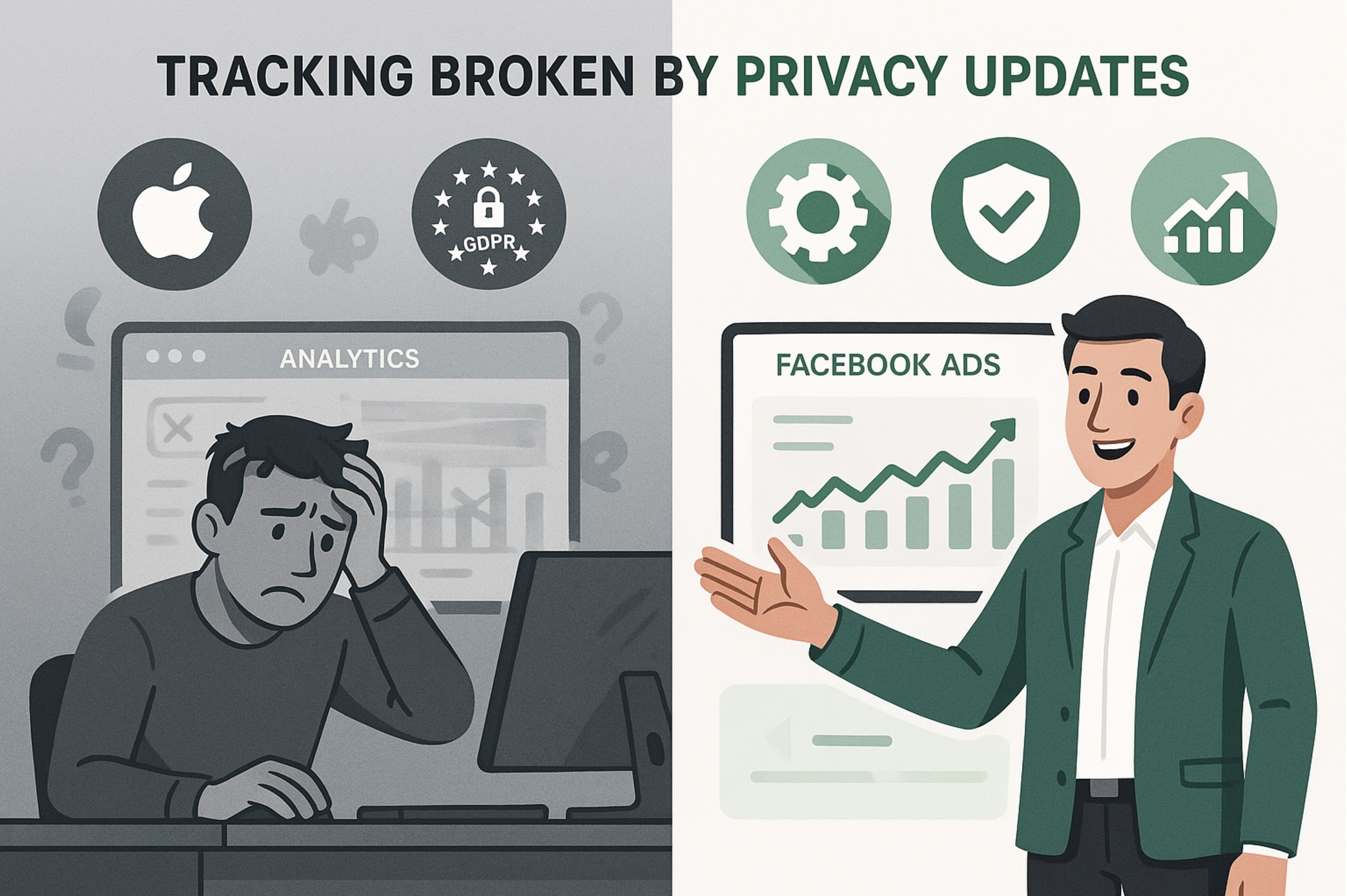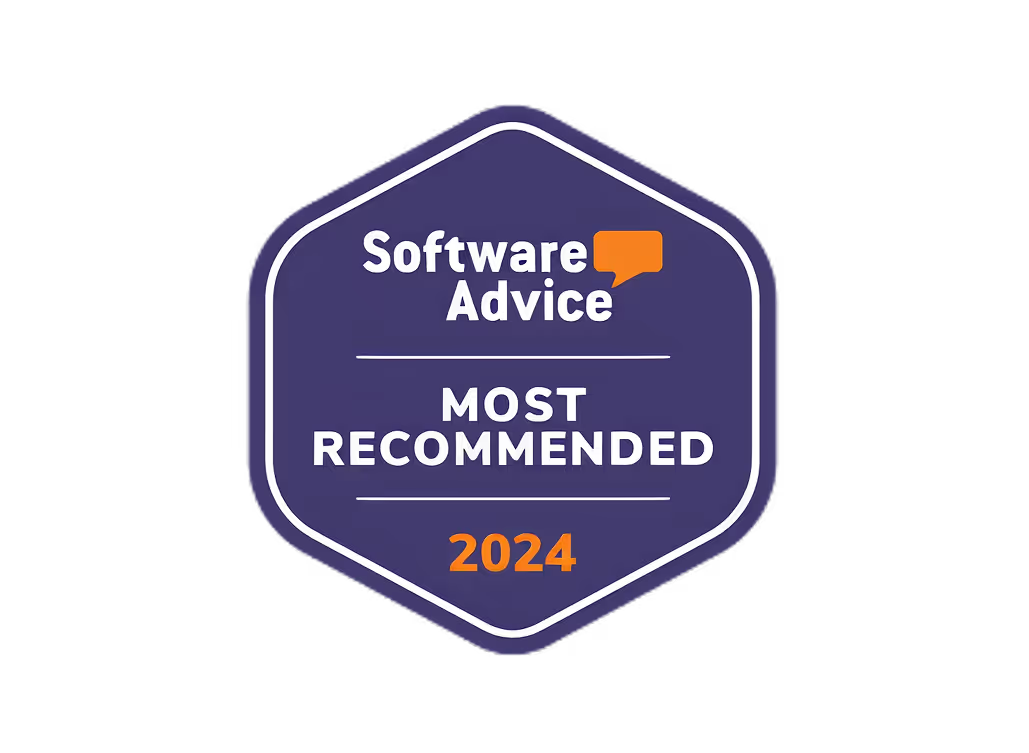Broken tracking not only hurts your ad performance but also your decisions.
You paused the wrong campaign. Scaled the wrong one, only to see reports don’t match actual sales. This is how teams lose trust in the data. It’s only natural for clients to ask questions you can’t answer.
And it all starts with missing signals—thanks to iOS updates, Meta changes, and outdated tracking setups.
Here’s what changed and why your ad performance is not what it used to be.

Why Your Facebook Ad Tracking Isn’t Working Anymore
Tracking used to be simple. The Facebook Pixel told you who clicked, who converted, and how much return you got.
But not anymore. iOS updates, Meta’s privacy shifts, and data laws like GDPR have changed that completely. The Pixel misses key events. Third-party data is drying up. And brands relying on retargeting or lookalikes are watching performance slump.
For ecommerce brands and small teams, this isn’t just annoying—it’s expensive. Your ads don’t reach the right audience, conversions go untracked, and reports stop making sense.
That’s why more teams are turning to a Facebook Ads Agency. The best ones—and even the decent ones—don’t just launch campaigns. They fix broken tracking and rebuild your setup to work in this new normal.
Understanding the Privacy Updates and Their Impact
Tracking on Facebook isn’t broken—it’s just not what it was. And if you’re still relying on the Pixel alone, good luck.
Since Apple rolled out iOS 14.5 and Meta updated its privacy settings, everything’s changed. Add GDPR and CCPA, and advertisers are flying half-blind.
Conversions slip. Attribution is unreliable. The data you relied on last year? Gone. Lookalike audiences are weaker. Retargeting needs a new strategy.
Ecommerce brands feel it the most. Small businesses with no in-house support are also hit hard.
That’s why more teams turn to a Facebook ad management agency. Not for the trend, for the results. You need someone who knows the rules and how to make them work for you.
At our ecommerce Facebook ad agency, we rebuild your setup from the ground up. Clean tracking, smarter attribution, and systems built for now.
Still debating whether the best Facebook ad agency is worth it? Ask yourself: are you growing? If not, you know what to do.
Common Advertiser Pain Points
Let’s be honest—privacy updates have made digital advertising more painful than ever. If you’re not working with a solid Facebook Ads Agency right now, you're basically flying blind.
1. Shrinking Audiences
Your once-reliable lookalike and remarketing campaigns are now failing. Suppose, after a major privacy update, a Denver-based ecom brand saw its audience size reduce by half.
That meant fewer people reached, higher costs, and repeat buyers aren't buying anymore.
No wonder the best Facebook Ads Agency is in such high demand—they know how to rebuild reach with first-party data and smart segmentation.
2. Attribution Gaps
Here’s the deal: you’re running ads on five platforms, but you have no idea which one drove that sale.
Take, for instance, a skincare startup we looked at that had completely mismatched numbers across Meta and Shopify. That’s what happens when cross-device tracking breaks down. A top Facebook Ad Management Agency fixes this mess with better attribution tools and server-side tracking.
3. Confusing Privacy Settings
Ever turned off "personalized ads" and still got weirdly accurate ones? Yeah, users hate that. One person thought a streaming app stopped tracking, but it kept showing ads based on watch history.
That confusion kills trust. A good Facebook Advertising Agency helps you work around these privacy quirks while still hitting the right people, without blowing your budget. And let’s face it, smart Facebook Ad Agency Pricing can be the difference between profit and panic.
Server-Side and Hybrid Tracking: The Essentials
Modern Facebook Ads strategies can’t rely on Pixel alone. With browser limitations, ad blockers, and stricter privacy rules, server-side and hybrid tracking have become essential for restoring visibility and performance.
A smart Facebook Ads Agency knows how to set this up right, giving brands a clear edge in a privacy-first world.
Server-side tracking routes user interaction data from your website to your server first, then forwards it to analytics or ad platforms. This bypasses browsers, improves data accuracy, extends cookie lifetimes, and reduces the impact of ad blockers.
Hybrid tracking combines both client-side (Pixel) and server-side methods for maximum reliability and deduplication—ideal for Facebook Conversions API setups.
How to Set Up Server-Side Tracking (Example: Google Tag Manager)
- Create a server container in Google Tag Manager.
- Set up your server (e.g., on Google Cloud Platform) and configure a custom domain for privacy and reliability.
- Update your website code to send tracking data to your server container instead of directly to analytics platforms.
- Configure tags, triggers, and variables in the server container to process and forward data as needed.
- Test thoroughly, then publish changes.
Privacy-Enhancing Technologies
Use cryptography (such as hashing or encryption) and data anonymization to safeguard user information while still enabling accurate measurement. Additionally, ensure that all data is filtered and processed securely on your server to meet privacy regulations before it's shared with any third-party platforms. Users can also take extra precautions to hide location on X to maintain their privacy while engaging online.
Preparing for Evolving Privacy Regulations
Stay updated on privacy law changes, and use modular, adaptable tracking and consent systems that allow for quick compliance adjustments. Regular audits of your setup help ensure you're consistently aligned with evolving privacy standards.
Client Education and Transparency
Clearly explain data collection and privacy practices to clients, and provide ongoing training and resources so they can understand, manage, and control how their data is used in campaigns.
A Facebook Advertising Agency helps navigate this complexity—from CAPI implementation to full-funnel measurement—ensuring your campaigns stay compliant, data-rich, and ready for what's next.

How a Facebook Ads Agency Helps You Stay Ahead
Privacy updates have turned ad tracking and targeting into a moving target. iOS changes, Meta’s policy updates, and regulations like GDPR and CCPA have made once-reliable tools like the Facebook Pixel far less effective.
That’s why many brands are leaning on experienced Facebook Ads Agencies—they adapt quickly, know what works, and keep performance from slipping when everything else shifts.
1. They Navigate Privacy Changes Before They Hit You
Privacy laws and platform updates don’t come with warning labels. A good agency monitors them in real-time and pivots your strategy before performance takes a hit.
Here’s an illustration.
A healthcare D2C brand in the EU saw a sharp drop in retargeting performance post-GDPR enforcement. Their agency quickly swapped out Pixel-based targeting for privacy-compliant contextual ads and rebuilt audiences using newsletter sign-ups and product quiz data—resulting in a 30% recovery in ROAS within a month.
Ask your agency how they handle compliance changes—and how fast they’ve responded to platform shifts for other clients.
2. They Replace Broken Tracking with Better Tools
With Facebook Pixel alone, you’re missing out on key data. The best agencies implement Facebook Conversions API (CAPI) and server-side tracking to restore visibility without relying on cookies or browser-based tracking.
A subscription business offering live webinars was seeing only 50% of leads reported in Meta Ads Manager. Their agency added server-side tracking via Google Tag Manager and CAPI, capturing CRM sign-ups and webinar registrations in real-time. Within two weeks, they saw a 40% lift in reported conversions, matching their backend data almost perfectly.
If your campaign reports don’t line up with actual sales or leads, ask if server-side tracking is in place.
3. They Build Audiences That Don’t Break
With third-party data vanishing, agencies are shifting to first-party and contextual strategies. That means tapping into email lists, purchase history, product page views, and on-site behavior to find and reach the right people.
It looks like this.
A sustainable fashion brand was hit hard by iOS 14.5’s impact on lookalike audiences. Their agency rebuilt custom segments using past purchase data, site behavior, and loyalty members.
They also layered in contextual targeting (e.g., users reading fashion sustainability blogs) and revived ROAS from 1.2x to 2.7x within six weeks.
Start collecting clean data—email lists, survey responses, or quiz data. Your agency can turn it into powerful, privacy-compliant audiences.
4. They Attribute Results Accurately (Even with Missing Data)
Attribution is messier than ever. Good agencies go beyond Meta’s built-in attribution and use tools like Google Analytics 4, blended ROAS, or multi-touch attribution to piece together what’s working.
A SaaS startup offering a free trial couldn’t figure out where its best leads were coming from. Their agency set up UTM parameters, offline conversion uploads, and GA4 events tied to trial sign-ups.
Turns out, Facebook ads were driving high-quality traffic that converted later via email nurtures, not in the initial click. They kept the channel and scaled the budget.
Ask your agency what attribution model they’re using—and if it tells the full story.
5. They Keep Testing, So You Keep Improving
Things change, the ad that worked yesterday will likely not work tomorrow.winning ad. Dedicated agencies test different hooks, formats, landing pages, and even audiences weekly or biweekly.
Here’s an hypothetical example.
A pet food brand wasn’t sure why its evergreen ad had stopped converting. Their agency tested five new variations—one with UGC-style video showing a real customer’s pet story ended up slashing CAC by 25%. They also tested new hooks that connected emotionally rather than purely focusing on features.
Don’t assume what worked three months ago still works. Get your agency to show recent A/B test results and their learnings.
Bottomline
If your Facebook ads aren’t working like they used to, it’s probably not your product or your copy. It’s your tracking.
Metrics don’t line up. Conversions go missing. And every report leaves you with more questions than answers.
This isn’t just an ad problem—it’s a data problem. And until you fix that, you’re making decisions with half the picture.
That’s why more brands are working with Facebook Ads Agencies that know how to set things right. Not just to run campaigns, but to clean up the mess that’s holding performance back.
So if things feel off, they probably are. Start by checking your tracking setup—it might explain more than you think.












%201.avif)